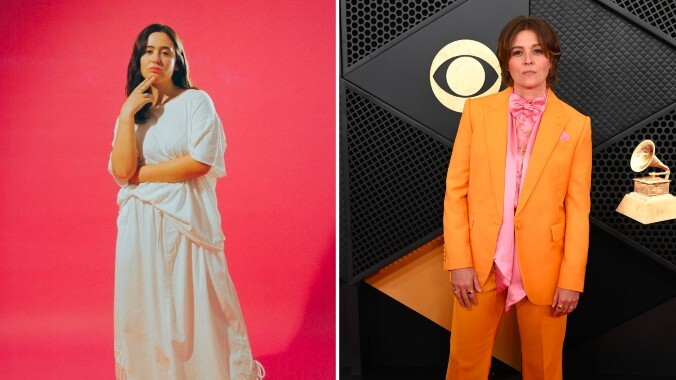Brandi Carlile and Tish Melton Are Mentoring Each Other
“Like most good partnerships, it really is kind of a two-way street," Carlile told Jezebel of working with Glennon Doyle's 17-year-old singer-songwriter daughter.
Photo: Handout; Shutterstock Entertainment
It’s been nearly three weeks since 16.9 million Americans tuned in to the Grammy Awards and watched as Joni Mitchell took the stage for the first time. Not far from the Los Angeles Convention Center, one 17-year-old singer-songwriter covered her eyes and cried along on her couch. For Tish Melton, the sight of an 80-year-old Mitchell singing Both Sides Now, one of her most celebrated–and sobbed to–songs was overwhelming. But unlike most high school seniors, Melton has a bit more in common with Mitchell than just confessionalist lyricism and calling California home.
On Mitchell’s flank that night was Brandi Carlile, the Grammy-winning artist and producer who’s been instrumental in her return to the stage after a brain aneurysm nearly rendered her incapable in 2015. She was by Mitchell’s side for a surprise performance at the 2022 Newport Folk Festival, just as she’ll be there in October when Mitchell plays the Hollywood Bowl. By now, anyone even vaguely familiar with Carlile knows that commending singer-songwriters–whether up-and-coming (Carook), established (The Secret Sisters), or veteran (Tanya Tucker)–is quite simply her constitution. Recently, Melton’s become one of those up-and-comers. She also happens to be the daughter of Glennon We Can Do Hard Things Doyle.
How Carlile and Melton met can really only happen to a kid born to an internationally lauded author and co-parented by one of the most famous women’s soccer players in the world, Abby Wambach. In short: As Melton became more serious about forgoing college and pursuing music full-time, Doyle sought the guidance of Linda Perry, the 4 Non Blondes frontwoman, producer, and another longtime champion of singer-songwriters. Perry is also the co-founder of EqualizeHer, an initiative that seeks to establish equal representation of women and non-binary people in the music industry. Perry advised Melton–who started making music during the pandemic–to keep going and by October 2022, she had a set at an EqualizeHer showcase at the famed Troubadour. Perry liked what she heard and sent a video of Melton’s performance to Carlile who, regardless of any skepticism, saw immediate promise in the teen’s penchant for navel-gazing and a natural ability to put her musings to music.
I know what you’re thinking: Melton is, for all intents and purposes, a nepo baby. You’re right, of course. Her talent, however, is as obvious as the fact that Carlile doesn’t exactly have a track record of offering her decorated hand to every New York Times bestseller’s spawn. After months of studio time, the pair collaborated on what became Melton’s debut EP, When We’re Older, a five-track rumination on the teenage experience from someone who, frankly, sounds very little like a teenager.
View this post on Instagram
Even upon first listening, it’s easy to identify who inspired Melton’s sound. There’s a bit of Lucy Dacus on “Michelle” which details a devotion that’s left its host truly indefensible, and a little Taylor Swift during a spell of spitefulness on “The Chase.” Regardless, Melton manages to bring something exceedingly rare to the EP (out March 1). In short: cohesive and clear-sighted songwriting that indicates she has more to say about fleeting youth–and all of the yearning that comes with it–than a lot of other burgeoning singer-songwriters.
Carlile wants the record to show that, even though it may sound like she’s Melton’s mentor, she’s gleaned just as much–if not more–from the high school senior: “Our mentorship has kind of gone both ways in that I’ve probably been given as much or more by Tish–musically and philosophically,” Carlile told Jezebel in a phone interview. “Like most good partnerships, it really is kind of a two-way street.”
-

-

-

-

-

-

-

-

-

-

-

-

-

-

-

-

-

-

-

-

-

-

-

-

-

-

-

-

-

-

-

-

-

-

-

-

-

-

-

-








































